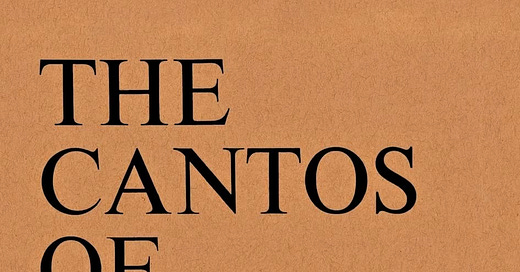To lead back to Splendor, Part 0
Prolegomena to a possibly misbegotten journey through Ezra Pound’s Cantos
I decided sometime last year that I was going to read Ezra Pound's mammoth epic poem of the twentieth century, the Cantos. Finding myself having some trouble continuing through this endeavor (more due to inertia than anything else) I recently decided that it might be a fun idea to blog through my reading from beginning to end.1 I don't think this should be a terribly long project, although I may be proven mistaken: I tend to read poetry quite quickly, and generally not particularly closely on the first go. I will however try to evaluate Pound on his own terms for the most part, and part of that process will be reading The ABC of Reading and possibly a few other Poundian texts as needed. My preliminary sense is that this whole thing should take about six weeks or so. I'll probably tackle each segment of the poem as it was originally published, beginning next week with the 1930 Draft of XXX Cantos. I think this should be manageable, though perhaps some of the segments will be split up into two parts. We'll see. I may or may not paywall the later entries in this series.2
I don’t plan to dwell on Pound’s politics, but I also don’t plan to not talk about them. As I said to
once (by way of comparison with Cerebus the Aardvark) the Cantos are partly about watching a guy’s brain get eaten by worms over thirty years. There's a Leo Strauss quote to the effect that it constitutes a problem for liberal democracy that the greatest philosophic mind of the twentieth century belonged to Martin Heidegger, who was of course a Nazi. There is certainly room to quibble with this paraphrase in ways that are beyond the scope of this post, but I brought it up primarily because it captures something of how I feel about Ezra Pound. Here is one of the greatest, in some moods perhaps the greatest poet this country has ever produced, and yet his career and his life were derailed by a predilection for extremism, a vile and abhorrent need to scapegoat someone for the world-historic calamities he lived through, to imagine some great Apollo brutalizing them in order to establish things in their right place. This is really a problem with Elliot as well, but he of course sided with the winning side in the second world war, and was somewhat more tactful and less sophisticated about his antisemitism, so the shadow is not cast quite as heavily as in this case. It’s not clear that Pound ever repented or changed his views either. Still, the entire project won’t be composed of Ezra Pound delenda est.Lastly a note on method: the Cantos are defined, as much of Pound's later poetry is, by a multilingual oscillation. often in the same line or stanza, and by a remarkable obscurity which has led to the poem being largely as
pointed out in his excellent Invisible College episode on Pound, unread even by the sort of people who read eight hundred page modernist epic poems. I have opted to largely pursue this initial reading without the aid of annotations or guides (ignoring the very sound advice of that such things are needed) and with only occasional recourse to translation of the many passages in non-english languages. Perhaps this is a foolish way to go about such a project, but it's the one I've chosen. Again, I may change my mind on this as we go along. I figure blogging it at you will keep me honest about finishing the poem, and hey-if this works I may well try it with some other significant poems that I've been looking to read this year. Herman Melville’s Clarel is an option, as is Louis Zukofsky’s “A”. Let me know what you think!Thanks to the subscriber chat for giving me the push.
All of my ideas for paid posts are about things nobody in would ever pay me to view, like non-linguistic comparisons of Bible translations or minutia changing between additions of the Strauss-Cropsey History of Political Philosophy.





I’m one of the lunatics who used to love nothing more than devoting a summer to some unreadable modernist epic: one summer it was Zukofsky’s “A”, another it was Olson’s Maximus Poems. The Cantos is the daddy of them all; I devoted a chapter of my dissertation to the pastoral dimension of the Pisan Cantos. All by way of saying I look forward to seeing what fresh eyes make of the old monster—and, as you seem to hint, what he might have to tell us about confronting world-historical calamity with a ton of poetic equipment and a minima of common sense.
I look forward to reading this series even though I have little interest in Pound, but I want to provide the datum that I would pay for the biblical translation analysis.